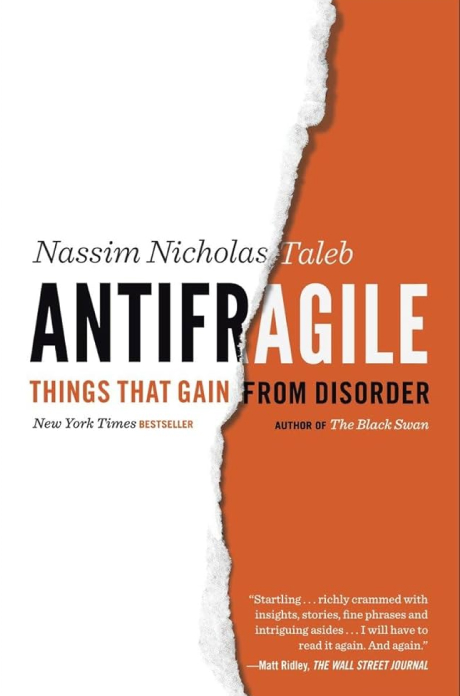Antifragile, Things That Gain From Disorder
Nassim Taleb's book "Antifragile" introduced a new way to think, or at least it re-introduced its necessity of what was forgotten from lessons that were around hundreds and even thousands of years ago. We all build on ideas of giants that have come before us and Taleb pulls on many common sense ideas that we seem to have forgotten. Taleb used Greek Mythology to explain some concepts. For example. 'Procrustes', was a rogue blacksmith and bandit. Procrustes had an iron bed, and any traveller who happened upon his dwelling was invited to spend the night. However, there was a catch, if the guest was too short for the bed, Procrustes would stretch them to fit, and if the guest was too tall, he would amputate the excess length.
Book Summary:
- Antifragility Concept:
Nassim Taleb's "Antifragile" introduces the groundbreaking concept of antifragility, describing systems that not only withstand shocks and stressors but thrive and benefit from them. Unlike mere resilience, antifragility involves active improvement in response to adversity. - Natural Systems as Examples:
Taleb frequently points to antifragility in natural systems, where entities like the human body adapt and grow stronger in response to stressors, such as weightlifting. He advocates for applying this principle to human systems to enhance adaptability and resilience. - Domain Dependence and Diversity:
Taleb warns against domain dependence, where the failure to recognise the benefits of stress in one area hinders its application to other aspects of life. The metaphor of Procrustes and the "Procrustean Bed" underscores the harm caused by forcing variations to fit a single model, sometimes we force mathematical models in situations that don't work in real life. - Turkey Problem Analogy:
The "Turkey Problem" illustrates the dangers of relying on past data and making predictions based on historical patterns. The Turkey Problem is a metaphor for a situation where everything seems normal and predictable until an unexpected and catastrophic event occurs. The "Turkey Problem" analogy highlights the danger of assuming future outcomes will mirror the past, using the well-fed turkey's comfortable life (until they meet their fate) as a metaphor. Taleb urges readers to embrace randomness, and adversity, and avoid the trap of assuming stability in an unpredictable world. - Stoic Principles and Hormesis:
Taleb invokes stoic principles to address the fragility that success can create, encouraging readers to practice poverty to reduce the fear of losing wealth. He introduces the concept of hormesis, where exposure to small stressors makes a system more robust, emphasising the harm of the absence of these stressors.
Lessons Learnt:
- Benefits of Antifragility: The primary lesson is the understanding of antifragility, where systems actively benefit from adversity, leading to improvement, adaptation, and increased robustness. Gains from disorder create a form of asymmetry, where positive shocks outweigh the harm from negative shocks.
- Active Improvement vs. Maintenance:
Antifragility goes beyond resilience by actively improving in response to challenges. The concept highlights the distinction between systems that merely maintain their status quo in the face of adversity (resilient) and those that actively grow stronger (antifragile). - Caution Against Domain Dependence:
Taleb's emphasis on domain dependence warns against the failure to recognize the benefits of stress in one area and apply it to other aspects of life. Diversity is crucial, and forcing variations to fit a single model, as illustrated by the Procrustean Bed metaphor, can be harmful. - Avoiding Assumptions and Turkey Problem:
The "Turkey Problem" analogy teaches the danger of assuming future outcomes based on past experiences. Embracing randomness, avoiding assumptions of stability, and being open to the unpredictability of the world are crucial lessons derived from this concept. - Stoic Principles and Adaptability:
Taleb's invocation of stoic principles, such as practising poverty to reduce the fear of losing wealth, emphasises the importance of adaptability and resilience. The concept of hormesis reinforces the idea that exposure to small stressors can make a system more robust, promoting adaptability and growth.
In "Antifragile Taleb presents a revolutionary perspective on resilience, adaptability, and thriving in an uncertain world. Taleb is an academic who never stops challenging conventional wisdom. We certainly enjoyed the read, we hope you do too.
Antifragile, Things That Gain From Disorder

Nassim Taleb's book "Antifragile" introduced a new way to think, or at least it re-introduced its necessity of what was forgotten from lessons that were around hundreds and even thousands of years ago. We all build on ideas of giants that have come before us and Taleb pulls on many common sense ideas that we seem to have forgotten. Taleb used Greek Mythology to explain some concepts. For example. 'Procrustes', was a rogue blacksmith and bandit. Procrustes had an iron bed, and any traveller who happened upon his dwelling was invited to spend the night. However, there was a catch, if the guest was too short for the bed, Procrustes would stretch them to fit, and if the guest was too tall, he would amputate the excess length.

Book Summary:
- Antifragility Concept:
Nassim Taleb's "Antifragile" introduces the groundbreaking concept of antifragility, describing systems that not only withstand shocks and stressors but thrive and benefit from them. Unlike mere resilience, antifragility involves active improvement in response to adversity. - Natural Systems as Examples:
Taleb frequently points to antifragility in natural systems, where entities like the human body adapt and grow stronger in response to stressors, such as weightlifting. He advocates for applying this principle to human systems to enhance adaptability and resilience. - Domain Dependence and Diversity:
Taleb warns against domain dependence, where the failure to recognise the benefits of stress in one area hinders its application to other aspects of life. The metaphor of Procrustes and the "Procrustean Bed" underscores the harm caused by forcing variations to fit a single model, sometimes we force mathematical models in situations that don't work in real life. - Turkey Problem Analogy:
The "Turkey Problem" illustrates the dangers of relying on past data and making predictions based on historical patterns. The Turkey Problem is a metaphor for a situation where everything seems normal and predictable until an unexpected and catastrophic event occurs. The "Turkey Problem" analogy highlights the danger of assuming future outcomes will mirror the past, using the well-fed turkey's comfortable life (until they meet their fate) as a metaphor. Taleb urges readers to embrace randomness, and adversity, and avoid the trap of assuming stability in an unpredictable world. - Stoic Principles and Hormesis:
Taleb invokes stoic principles to address the fragility that success can create, encouraging readers to practice poverty to reduce the fear of losing wealth. He introduces the concept of hormesis, where exposure to small stressors makes a system more robust, emphasising the harm of the absence of these stressors.
Lessons Learnt:
- Benefits of Antifragility: The primary lesson is the understanding of antifragility, where systems actively benefit from adversity, leading to improvement, adaptation, and increased robustness. Gains from disorder create a form of asymmetry, where positive shocks outweigh the harm from negative shocks.
- Active Improvement vs. Maintenance:
Antifragility goes beyond resilience by actively improving in response to challenges. The concept highlights the distinction between systems that merely maintain their status quo in the face of adversity (resilient) and those that actively grow stronger (antifragile). - Caution Against Domain Dependence:
Taleb's emphasis on domain dependence warns against the failure to recognize the benefits of stress in one area and apply it to other aspects of life. Diversity is crucial, and forcing variations to fit a single model, as illustrated by the Procrustean Bed metaphor, can be harmful. - Avoiding Assumptions and Turkey Problem:
The "Turkey Problem" analogy teaches the danger of assuming future outcomes based on past experiences. Embracing randomness, avoiding assumptions of stability, and being open to the unpredictability of the world are crucial lessons derived from this concept. - Stoic Principles and Adaptability:
Taleb's invocation of stoic principles, such as practising poverty to reduce the fear of losing wealth, emphasises the importance of adaptability and resilience. The concept of hormesis reinforces the idea that exposure to small stressors can make a system more robust, promoting adaptability and growth.
In "Antifragile Taleb presents a revolutionary perspective on resilience, adaptability, and thriving in an uncertain world. Taleb is an academic who never stops challenging conventional wisdom. We certainly enjoyed the read, we hope you do too.
